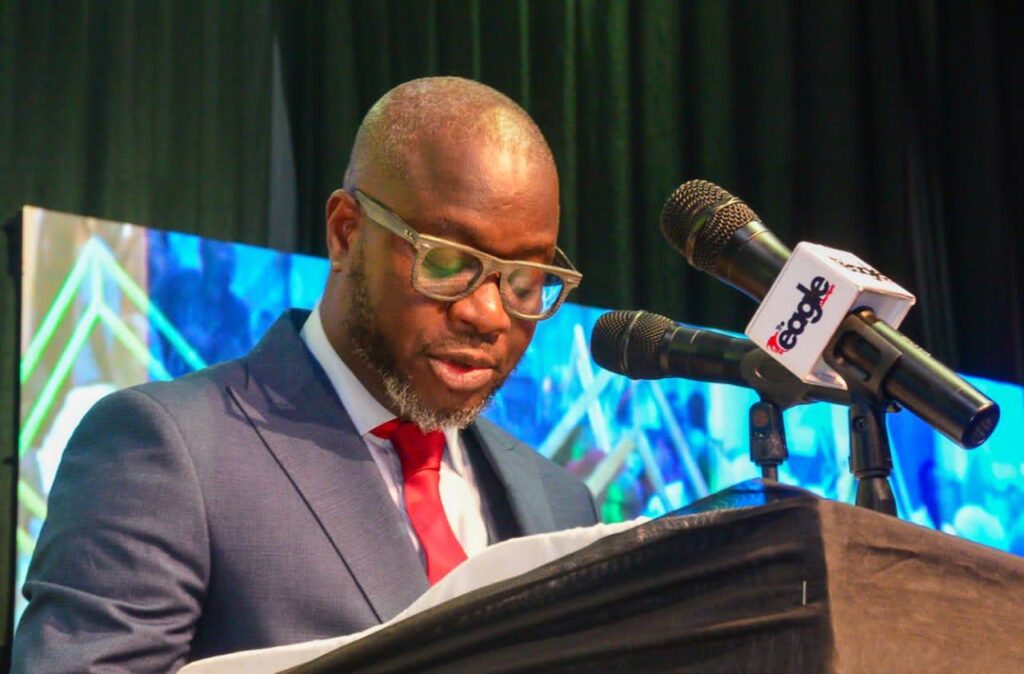The society we live in now is driven by rapid changes. The need to evolve accordingly, especially in the media, was the focus of the exaugural lecture by the immediate past Editor of The PUNCH Newspaper, Adedayo Oketola in Lagos last Tuesday.
Oketola held the lecture to mark his exit as the Daily editor of the newspaper and also launched his book titled “The Catalyst: Nigerian ICT Evolution through a Journalist’s Lens.”
The glamorous event held at Muson Centre, Onikan, Lagos had various dignitaries, including Former President Olusegun Obasanjo, Former Minister of Transportation, Rotimi Amaechi, Rev. Mother Esther Ajayi, Editors of various prestigious newspapers and other top dignitaries of the media industry in attendance.
Oketola’s lecture titled Print Journalism in Peril: How Editors are Battling the Challenges, centred on what has become of journalism due to digitization and the notion that younger journalists are incapable of being title editors of newspapers.
According to Oketola, access to smartphones and the internet has made almost anyone claim to be a journalist, with many engaging in content plagiarism, not fact-checking information and violating other codes of the profession’s ethics.
He spoke of the need for newspapers to evolve and be more multimedia in their content dissemination as they are already doing through their websites and social media platforms.
Oketola urged fellow journalists and editors to rethink, innovate, and remind themselves why they took on their jobs in the first place.
READ ALSO: ‘Not too young to be newspaper editors’
“The challenges are immense, but so are the possibilities. The core values of journalism—accuracy, integrity, and credibility—are more important now than ever. The noise online can be overwhelming, and it’s easy to be swept up in the race for clicks, but the printed word still carries weight.
“Readers may be distracted by the constant influx of information, but they continue to turn to reliable sources when the noise becomes too much. We can still be that trusted source, but only if we stick to what matters: the truth,” he stated.
According to him, the fundamental problems plaguing print journalism, include dwindling advertising revenue, declining circulation, digitalization of the media industry, structural challenges in the management, poor strategic planning and lack of investment in digitalization.
“Editors cannot make their content advertisers friendly without compromising their integrity,” he said, noting that it is difficult to convince a population facing economic hardship to pay for news they can get for free elsewhere.
Editors have to create contents that resonate with audiences and advertisers and also adhere to management decisions.
While noting that print journalism in Nigeria faces a tough road ahead with the rise of digital media, the decline in advertising revenue, political pressures, and the spread of misinformation are challenges that test even the most resilient newsrooms, Oketola said print journalism remains essential.

“It’s a foundation that has been responsible for holding power to account, informing the public, and providing a steady voice in the noise of modern media. While digital platforms seem to dominate the space, print journalism still holds a unique position, especially when it comes to delivering thoughtful, well-researched content that doesn’t fall victim to the fast-paced nature of online misinformation. We still offer something that digital media often lacks—credibility built on years of commitment to integrity and thoroughness.”
Though the path ahead may seem daunting and the pressures of undeniable upcoming journalists, Oketola urged them to stay rooted in the values that define good journalism—accuracy, thoroughness, and fairness.
“These are not negotiable, no matter how fast the world around us changes. The landscape may shift, but the need for truth remains. My advice is to keep evolving, yes, but never forget the basics. Digital skills are important, but so are ethics. It’s easy to get lost in the allure of quick news cycles and viral stories, but the power of journalism lies in its ability to inform, educate, and hold those in power accountable.”
Regarding the notion by some veteran journalists that young journalists are incapable of being title editors of newspapers, Oketola said it is “both flawed and detrimental to the growth and dynamism of the media industry.”
He argued that young editors should also be given a chance as leadership capacity is not determined by the length of service in the industry, but by dedication, creativity, hard work and the grace of God.
“Young editors can bring fresh perspective fresh ideas and an understanding of changing technological and cultural innovations to the changing dynamics of modern journalism. Younger editors can bridge the gap between traditional journalism and the new media landscape,” he stated.
Former President Olusegun Obasanjo who was the special guest of honour at the occasion recalled the history of telecommunication in Nigeria and how service providers like GLO, MTN and Econet were licensed.
According to the elder statesman, the money paid by the companies was used to finance the development of telecommunication in Nigeria.
The elder statesman also spoke on the development of the country saying investments would not come into the country unless there is a conducive environment.


